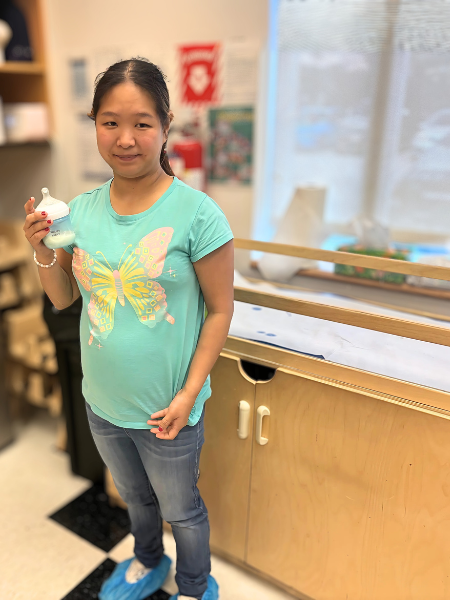On a weekday morning at ABC Little Steps Daycare in Harlem, the infant room is full of coos and giggles. Amid the bustle, one teacher’s assistant stands out with her calm, steady presence. For more than a decade, Mei-Feng Cheung has been a cornerstone of the daycare, feeding infants, rocking them to sleep, and earning the trust of families who often invite her to babysit outside of work.

Her supervisor, Mary Ellen Rooney, still remembers when Cheung first arrived in 2008 as a high school intern. “She stood out immediately,” Rooney said. “She has such a natural gift for caring for children. Families trust her deeply, and the babies just adore her.”
Cheung agrees. “I love working with babies. It comes easy to me, and playing with them makes me happy,” she said.
Over the years, Cheung, 39, has grown from a shy volunteer into a dependable professional. She brings creativity to the classroom, like teaching kids about her culture during Lunar New Year.
“Her longevity and loyalty are something every employer values,” Rooney said. “She’s truly an essential part of who we are.”
Cheung’s story is one of hundreds shaped by YAI’s supported employment program, which connects people with intellectual and developmental disabilities (I/DD) to meaningful work in their communities. For people with I/DD, earning a paycheck is more than financial, it’s about independence, confidence, and social connection.
Yet employment remains a steep challenge. Nationally, only 22% of working-age people with I/DD are employed, compared to over 60% of the general population. Those who do find jobs often face barriers such as limited advancement or a lack of accommodations.
YAI’s employment program is helping to change that. People supported by YAI remain on the job for an average of nearly eight years, an impressive statistic in today’s labor market where turnover is high. With partnerships in retail, healthcare, hospitality, and office services, the program doesn’t just create jobs, it builds careers.
The comprehensive program provides pre-vocational training, volunteer opportunities, and on-the-job coaching. Staff also train employers, offering the tools and support they need to confidently hire and retain neurodiverse talent.

For Sleiter Martinez, a 27-year-old with a passion for food service, YAI’s program has been transformative. His job coach, Megan Oyatta, remembers his determination when he joined in 2024. “He always showed up to our job readiness sessions, was professional, and made it clear his dream was to work in food service,” she said.
With Oyatta’s support, Martinez applied for a position at the Hard Rock Cafe in Times Square and landed a job as a busser in April 2025. Although the restaurant is fast-paced, he quickly adapted.
“In training, everyone gave me advice and told me not to be afraid to ask questions,” Martinez said. “That’s been very important for me. Even if it takes two or three times, asking questions helps me really remember what to do.”
At first, Martinez was shy and hesitant to ask for help. Oyatta often stepped in to bridge communication with management. Today, he’s advocating for himself and handling those interactions independently.
“Employers can make a big difference by slowing down when speaking, giving clear instructions, and checking in,” Oyatta explained. “What seems obvious to one person may not be to someone else, so a little extra time and clarity goes a long way.”
Like Martinez, Cheung has also grown through support and encouragement on the job. At ABC Daycare, professional development is an expectation for everyone.
“As her supervisor, I see it as my responsibility to challenge Mei just like any other staff member,” Rooney said. “She’s mastered infant care, but we don’t stop there, we keep finding ways for her to expand her skills.” With YAI’s help, Cheung is now working on tasks like responding to emails and building confidence with technology.
Rooney says the benefits go far beyond filling a role. “Mei enriches our whole team. She brings creativity, dependability, and perspective. She notices details others might miss like remembering birthdays or picking out thoughtful gifts for the babies. That kind of care changes the culture of a workplace.”
Cheung and Martinez’s journeys reflect the larger vision of YAI’s Supported Employment program: creating pathways where people with I/DD are not only employed but thriving. For participants, success means independence and pride. For employers, it’s about discovering the strengths that neurodiverse employees bring to the table.
“For me, as an employer, Mei is the perfect example of why it’s so important to include neurodiverse talent in the workforce,” said Rooney. “If employers don’t widen their hiring pool, they’re missing out, not just on skilled employees, but on the creativity and talent that move an organization forward.”

